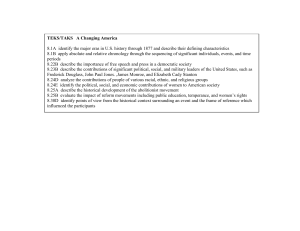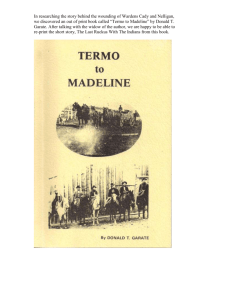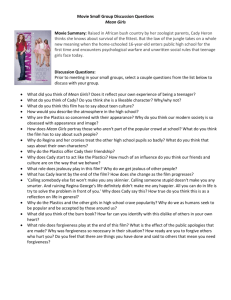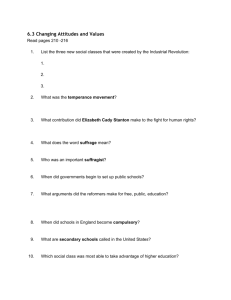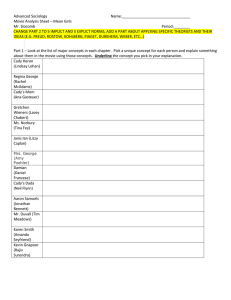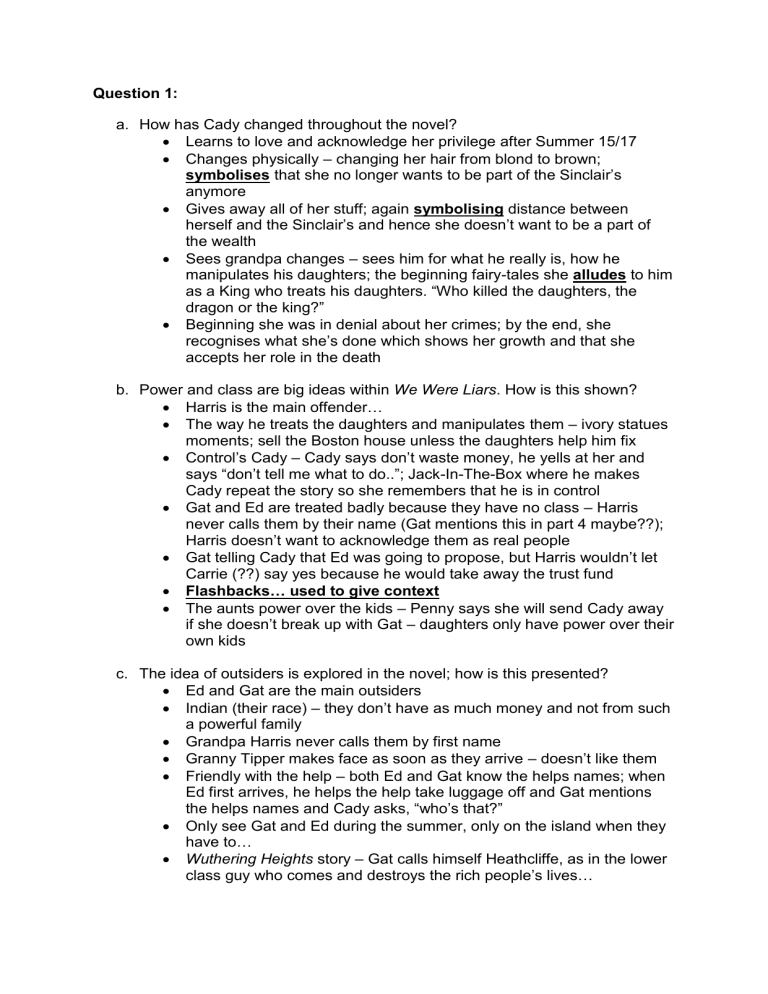
Question 1: a. How has Cady changed throughout the novel? Learns to love and acknowledge her privilege after Summer 15/17 Changes physically – changing her hair from blond to brown; symbolises that she no longer wants to be part of the Sinclair’s anymore Gives away all of her stuff; again symbolising distance between herself and the Sinclair’s and hence she doesn’t want to be a part of the wealth Sees grandpa changes – sees him for what he really is, how he manipulates his daughters; the beginning fairy-tales she alludes to him as a King who treats his daughters. “Who killed the daughters, the dragon or the king?” Beginning she was in denial about her crimes; by the end, she recognises what she’s done which shows her growth and that she accepts her role in the death b. Power and class are big ideas within We Were Liars. How is this shown? Harris is the main offender… The way he treats the daughters and manipulates them – ivory statues moments; sell the Boston house unless the daughters help him fix Control’s Cady – Cady says don’t waste money, he yells at her and says “don’t tell me what to do..”; Jack-In-The-Box where he makes Cady repeat the story so she remembers that he is in control Gat and Ed are treated badly because they have no class – Harris never calls them by their name (Gat mentions this in part 4 maybe??); Harris doesn’t want to acknowledge them as real people Gat telling Cady that Ed was going to propose, but Harris wouldn’t let Carrie (??) say yes because he would take away the trust fund Flashbacks… used to give context The aunts power over the kids – Penny says she will send Cady away if she doesn’t break up with Gat – daughters only have power over their own kids c. The idea of outsiders is explored in the novel; how is this presented? Ed and Gat are the main outsiders Indian (their race) – they don’t have as much money and not from such a powerful family Grandpa Harris never calls them by first name Granny Tipper makes face as soon as they arrive – doesn’t like them Friendly with the help – both Ed and Gat know the helps names; when Ed first arrives, he helps the help take luggage off and Gat mentions the helps names and Cady asks, “who’s that?” Only see Gat and Ed during the summer, only on the island when they have to… Wuthering Heights story – Gat calls himself Heathcliffe, as in the lower class guy who comes and destroys the rich people’s lives… intertextuality – shows the reader how Gat feels about himself through a reference to a well-known story Fairytale stories where Gat is depicted as a mouse – even in the stories, Gat has no power and is only seen as an animal, which is small and not liked by others - symbolic Question 2: a. Choose one of the fairy tales that Cady tells in We Were Liars and explain its significance to the overall story. Fairy tale 6 – Witch and fire Foreshadows to the reader that a fire is going to happen and that people will die; Cady will cause it Cady refers to herself as a “witch” which metaphorically shows that she thinks she is guilty and the bad guy Cady describing herself as a witch also shows that she feels out of place… Did Cady light the fire deliberately? Or does she just feel really bad? b. Cady uses lots of hyperbolic metaphors. Choose two and explain how they make her an unreliable narrator. When her dad leaves and she says she got shot in the chest – tricks the reader into thinking she’s been shot until they realise that she is being overdramatic. Makes it difficult for the audience to trust her almost immediately because she turns everything into something over dramatic, hence unreliable. Audience is supposed to trust narrator, but how can we trust Cady? Gat let her “bleed” on him… demonstrates that Cady is overemotional and reacts to small inconveniences with over the top responses – when they first mention Tipper or her dad… Witch in her head/above her bed... medication causing her to lose it. She’s drugged up, which means don’t know if what she remembers actually happened, or she made it up because of the drugs… takes a lot of drugs… fuzzy because the drugs c. The tragic ending of the novel is foreshadowed frequently throughout. Select two (or three) examples and explain them. When none of the parents talk to any of the Liars in Summer 17; Penny asks who she was playing tennis with… Penny says Cady is spending a lot of time alone Cuddledown… When Cady speaks to aunt Carrie in the middle of the night about Johnny – Carrie refuses to acknowledge the convo next morning (likely bc Carrie was grieving/sleep walking??) When Cady sees the Liars in Summer 17, she says they haven’t changed and they’re wearing the same clothes… they literally haven’t aged because they’re dead. Whole conversation about “death” – “our youth is wasted”… towards the end of part 3. “We were young…” Gat gets mad when Cady says she wants to die. “The island is ours. Here, in some way, we are forever young.” Question 3: a. Who is responsible for the deaths of Gat, Johnny and Mirren? Grandpa Harris He forced the Liars to go to drastic measures to stop the fighting Summer 15 there’s heaps of arguing and fighting, which the Liars hate… The Liars are forced to “beg” Harris for certain objects, which they hate – if Harris hadn’t been so controlling, maybe the kids never would have died. Fairy-tale 2; the dragon and the king. “Who killed the daughters, the dragon or the king”… Foreshadowing Harris’ blame… b. Are the Liars ghosts or hallucinations? Justify your opinion. Ghosts… Haven’t changed/aged Walk into the water and disappear; Mirren or Johnny say they cant stay anymore because they’re tired… Taft and the twins obsessed with ghosts, only makes sense if they’ve one… In the last fairy-tale, “ghost” is mentioned c. Does Cady deserve sympathy by the end of We Were Liars? d. Does We Were Liars have a happy ending? Bittersweet It’s sad because 3 children have died – a loss of life is never good and the parents have been traumatised and changed for life (talk about how the aunts are closer and in mourning) But there is also growth – the remining children have learned to acknowledge their privilege (the last fairy tale is useful to demonstrate this)
